Laura Shovan's Blog
December 1, 2022
Poetry Friday: When I Cry
November 10, 2022
Poetry Friday: The Button Box
August 25, 2022
Poetry Friday: Dog Update
August 11, 2022
Poetry Friday: Jane Austen, Poet?!
August 4, 2022
Poetry Friday: Baking Challah
May 19, 2022
Poetry Friday: I Am Here Now
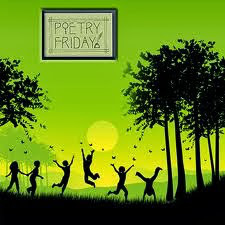
Carmela at Teaching Authors is hosting Poetry Friday this week. Check out all of this week’s original poems, book reviews, links, and news at Carmela’s blog.
I’ve been away from Poetry Friday for a few weeks. Today, I’m back with an exciting interview.
Everyone, please meet Barbara Bottner, author of the YA verse novel I Am Here Now.
According to Goodreads:
Set in the 1960s, Barbara Bottner’s I Am Here Now is a beautiful novel in verse about one artist’s coming of age. It’s a heartbreaking, powerful and inspiring depiction of what it’s like to shatter your life―and piece it all back together.
You can’t trust Life to give you decent parents, or beautiful eyes, a fine French accent or an outstanding flair for fashion. No, Life does what it wants. It’s sneaky as a thief.
Maisie’s first day of high school should be exciting, but all she wants is to escape.
Her world is lonely and chaotic, with an abusive mother and a father who’s rarely there to help.
So when Maisie, who finds refuge in her art, meets the spirited Rachel and her mother, a painter, she catches a glimpse of a very different world―one full of life, creativity, and love―and latches on.
But as she discovers her strengths through Rachel’s family, Maisie, increasingly desperate, finds herself risking new friendships, and the very future she’s searching for.
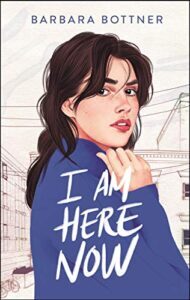
Available at Bookshop.Org.
Barbara and I met because we are both contributors to the new middle grade anthology Coming of Age: 13 B’Nai Mitzvah Stories. Although she is a seasoned author, I Am Here Now is her first novel-in-verse. It came out in the first summer of the pandemic, August 2020.
Here are five questions for Barbara Bottner:
Q1. Setting is an important element of Maisie’s story. She is growing up in the Bronx in New York City in the 1960s (where my dad lived as a child in the 1940s and 50s!). Maisie describes her parents’ rocky marriage in terms of the noise, commotion, and restlessness of the city. What do you think the city symbolizes in Maisie’s poems and story?
Barbara: Even though so many of my choices for this book were authentic to my growing up, being a teen in the Bronx was not one of them. When I was seven we moved to Long Island, in Great Neck, a sort of Jewish ghetto where many families like mine, wanted to give their kids a better education and escape the growing tensions in the inner city. But that exact tension, for my purposes in choosing a setting that would mirror Maisie’s situation, did more to bring the atmosphere of danger and explosion to the reader. In the early sixties, the Bronx was at the beginning of its undoing which happened a few year later: it was losing it’s ‘safe haven’ status. I felt that was more to the issues of the novel than putting Maisie in restful suburbia.
Q2: This is your first novel-in-verse. Did you find it more challenging to draw characters in the small space of a poem? How does Maisie’s love of and talent with art help show her growth in the novel?
Barbara: I love writing free verse even though as you state, it was my first time out in this format. But I had written tons of picture books and I found a commonality in that both allow an author to tell a lot of story in a small space. In the process of writing it, I found there’s eloquence in the unstated. I also loved how one can contradict oneself for dramatic effect. I loved how I could skip around, leave a character with the hopeful involvement of the reader knowing I’d return to it. It also enabled me to capture teenage intensity and extravagance. The form easily allows an author to skip having to explain every last connection; I found it magically in alignment with how I wanted to tell the story. Once I did transfer some of the book into prose. It was deadly; everyone agreed. We leave a little more in the reader’s hands with free verse, maybe even ask them to fill in some things for themselves. It also asks the writer to deeply consider words, verbs, syntax. Every last word should be the best one….as it is in all poetry.
“You can go for the jugular fearlessly and always aim to be honest, potent, challenging and revelatory. It’s like moving from one room to another without the hallway that sometimes prose seems to demand. I like the ‘take no prisoners’ aspect of free verse.” —Barbara BottnerQ3. Maisie lives with an abusive parent, her volatile mother. I’ve heard many verse novelists and poets say that the white space of a poem helps readers cope with reading trauma on the page. Do you agree with that and why?
Barbara: I absolutely agree, although I’m not sure I ever thought about it in this way. For some of the attributes I noted above, this is surely true. You can cut away in an instant without having to explain, “it was a day later….” You can jump to that day and take off all over again. It’s so immediate. And you can go internal to, say, the character’s love of drawing while you know she’s just been slapped or taken down by a trauma. This then, makes everything more intense. It’s never tedious. You can go for the jugular fearlessly and always aim to be honest, potent, challenging and revelatory. It’s like moving from one room to another without the hallway that sometimes prose seems to demand. I like the ‘take no prisoners’ aspect of free verse and also, as you say, the opportunity to have them live out from another part of themselves.
Q4. In your author’s note, you talk about the overlap between Maisie’s story and your own. How did writing in verse give you a lens for looking back at your own experiences?
Barbara: To me, free verse gives you the opportunity to drive in the fast lane and never stop. Mundane things can be handled so easily, even in a line, with no deadly paragraphs to explain. You can drive over the speed limit. I was writing about chaos, violence, extreme emotions, betrayal, disappointment, longing. With those states of mind, you don’t want a lot of housekeeping about the subway stops or who cleaned the kitchen. My own childhood was chaotic, intense and I was often scared for my survival. As a character in that kind of scene, I wasn’t noticing the plates dinner was on, or why my mother was yelling at the gardener unless those things directly related to my own well-being. So not having to give that information to the reader meant I could stick with exactly my state of mind and the observations and choices I’d make to try to feel safe. I get bored, often, reading the works of authors whose pace is relaxed and telling you about the garden. I’m more of a blade runner and respond more to danger, misunderstanding, personality problems. My questions about life are pretty fundamental.
Q5. Maisie is such a complicated teen. She’s proud of her Jewish and Hungarian heritage, but feels very much like an American teen in the music she likes, the dances she goes to. She has complex feelings about her mother, her father, her brother, her best friend, and her own sexuality. How do you think poetry provided a container for Maisie’s character?
Barbara: Well, poetry and teens have been going together for decades. I wrote bad poetry when I was young. Poetry forces you to get down to the essence of what you want to express. And to find language, images, snippets of dialogue that are eloquent. It strips down the padding, which works wonderfully for teenagers who themselves have little padding. I also loved contradicting myself; that is a wonderful device that free verse offers. I had a friend who would express something quite vehemently, then moments later express the opposite. I teased her, that it was like watching someone trounce down the street very emphatically, then suddenly turn and walk the opposite way equally emphatically. Free verse allows the author this kind of leeway. We can create very fast turns. And be convincing about them and I find this to be powerful and real. I wrote about all the character in I Am Here Now at length, and most of that did not make it into the book. Some of it was first person. I needed to get inside them and hear their thinking and rationalization for their lack of accountability. Because it can serve as a shorthand, in this way, I got to know their cores, thus their voices in how they spoke to themselves. And verse helped me get out of scenes before I murdered them with too many words.
Tweet
April 14, 2022
Happy 6th Birthday to The Last Fifth Grade!
Dear Poetry Friday friends,
I have a Passover-themed post for you this week, with a poem, a recipe, and book recommendation, and a giveaway! But first, thanks to Matt Forrest Esenwine for hosting Poetry Friday this week. Head over to Matt’s blog, Radio, Rhythm & Rhyme for this week’s poetic links.
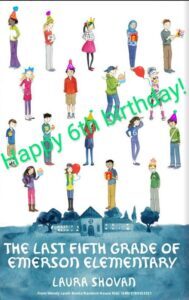
But first, happy 6th birthday to the fifth grade poets of Emerson Elementary. The Last Fifth Grade of Emerson Elementary was published six years ago this week, right in the middle of National Poetry Month.
Look! Ms. Hill’s class has their party hats, balloons, and cake. To celebrate, I’m giving away six copies of the paperback on Twitter. Here’s the link to RT.
One of the poems in The Last Fifth Grade is about matzo, the unleavened bread we eat during the ten-day Passover festival.
Rachel (pictured top row, middle, as imagined by illustrator Abigail Halpin) writes about her discomfort at having to sit at the allergy-free table at school, how her friends pepper her with questions, and how sharing food (matzo candy) helps her classmates connect with her Jewish traditions.
As Jennifer Greene, the editor of my book A Place at the Table so wisely said, food is often a person’s first experience of a new culture.
Marvelous Matzo
By Rachel Chieko Stein
Passover is my favorite holiday.
I love matzo for lunch, spread thick
with cream cheese and strawberry jam.
I love how the matzo crunches
around the soft cream cheese
and gooey jelly.
I promised my dad I would eat
at the allergy- free table during Passover
even though people eat bread there
because the janitors
keep that table really clean.
But when I sit at the allergy- free table,
my friends think I am mad at them.
“Why aren’t you sitting with us?”
“Why do Jewish people eat weird food?”
“You have to eat that for a whole week?”
“Don’t you miss bread?”
I told my dad I wanted a thermos of soup
instead of a delicious matzo, cream cheese,
and jam sandwich for lunch.
He took out a recipe
covered with chocolate streaks.
“Aunt Jennie’s Matzo Candy.”
We buttered matzos, baked them
until they were hot, spread them
with chocolate and butterscotch chips.
Melting, crispy, buttery, sweet. Mmmm.
Dad said, “I think this is the right medicine.
See the bottom of Aunt Jennie’s recipe . . .?
To stop teasing, administer
one dose to classmates.”
I didn’t see anything written on the recipe.
But when I shared Aunt Jennie’s candy at lunch,
no one said matzo was weird.
This poem refers to an actual, beloved recipe handed down to me by my friend Jennie Steinhauser. You may see other versions of it online, where it’s often called “Matzo Crack.” (Here’s one to try.)
“Aunt” Jennie’s Matzo Candy (Serves 1)
1 c. sugar
1 c. butter
6 oz. chocolate chips
6 oz. peanut butter chips
matzos
Preheat oven to 450 degrees. Melt butter, add sugar, and bring to a boil. Boil for 3 minutes. Stir. Pour over matzos on foil-covered cookie sheets. Bake 7 minutes (or maybe less). Take out and pour on peanut butter chips. Let set 30 seconds and spread. Repeat with chocolate chips. Stick in the fridge for 30 minutes, then break into pieces. Eat a whole bunch. Like on the couch. Eat some more.
You can see why we all love Jennie!
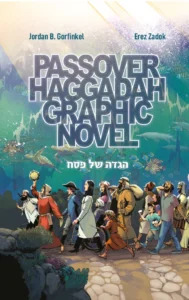
Add it to your Haggadah collection! Available here.
This year, we’re trying something new at our family Seder (the Passover meal, where we–short version–retell the story of Exodus, share prayers, sing, and eat special foods like matzo). Instead of our usual Haggadah, we are using the Passover Haggadah Graphic Novel.
It’s Thursday as I write this post. I’ll be making Jennie’s Matzo Candy this afternoon, along with charoset, a mixture of apples, nuts, wine, and honey that represents the mortar Jewish slaves used to build Pharaoh’s pyramids. But I digress — I hope to post Matzo Candy photos soon.
TweetApril 7, 2022
Poetry Friday: New Book! Coming of Age
 It’s Poetry Friday! Thanks to this week’s host, Janice Scully of the blog Salt City Verse. Visit Janice for links to poetry posts and National Poetry Month projects from the whole PF blogging community.
It’s Poetry Friday! Thanks to this week’s host, Janice Scully of the blog Salt City Verse. Visit Janice for links to poetry posts and National Poetry Month projects from the whole PF blogging community.
I have a special treat for you today, poets and poetry fans… a soon-to-be-published poem from Jane Yolen!
Jane was kind enough to contribute an opening poem for the new middle grade anthology COMING OF AGE: 13 B’NAI MITZVAH STORIES.
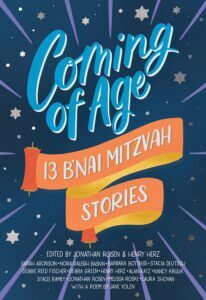
Find it at Bookshop.org Or try your luck with this Twitter giveaway!
The book, edited by authors Henry Herz and Jonathan Rosen, publishes on April 19, just as Jews around the world celebrate Passover.
Here is the Booklist review, to tell you a little bit more about COMING OF AGE:
Twelve short stories and a poem, connected by shared faith and stage of life, explore the Jewish rite of passage of b’nai (bar and bat) mitzvah in an expansive and accessible collection for middle-grade readers of any faith. With contributions from notables including Jane Yolen (“Ceremony”) and Laura Shovan (“A Funny Thing Happened on the Way to the Bimah”), this easygoing collection spans millennia and locales. Stops along the way include Noah’s Ark, the Upper West Side in 1922, hotel reception rooms, synagogues, Greece, and even the pun-filled Planet Latke. Mitzvot are made and valuable lessons learned, particularly among protagonists who appreciate the sentiment behind their simpler celebrations. “[T]he yacht, the band, the dancing—they were all false idols” to the girl envying her cousin’s lavish party from her own pandemic-era parking-lot affair. The feel-good collection weaves threads among disparate adolescent episodes in a way that successfully honors the individuality of the coming-of-age experience without losing sight of this unifying factor: Judaism. Mazel tov!
(Want more info? Details, reviews, and bonus resources are here.)
I am so excited to have a short story in this collection called “A Funny Thing Happened on the Way to the Bimah.” The full list of contributors is Sarah Aronson, Nora Raleigh Baskin, Barbara Bottner, Stacia Deutsch, Debbie Reed Fischer, Debra Green Garfinkle, Henry Herz, Alan Katz, Nancy Krulik, Stacie Ramey, Jonathan Rosen, Melissa Roske, and me, plus Jane Yolen’s poem.
After you read Jane’s poem, stick around and I’ll tell you a little bit about my story.
Ceremony
by Jane Yolen
Whether or not there is a ceremony,
you will come of age.
Life hands you days, years,
not parties.
It is the days that count,
the years.
“Wear them well,”
my grandmother used to say.
And I do,
even though Bat Mitzvahs
hadn’t been invented yet.
From COMING OF AGE: 13 B’NAI MITZVAH STORIES.
***
Here is a sneak peek at my story’s plot…
Dani Karet is in a pickle. It’s almost time for a pre-bat mitzvah check-in with the rabbi, but Dani still hasn’t written her d’var Torah (speech). When she asks friends and family for help, their advice ranges from choreographing the Ten Plagues as a K-Pop routine to telling dinosaur fart jokes. Will Dani come up the perfect speech or will she snap before the big day?
and one of its themes, being an ally…
In “A Funny Thing Happened on the Way to the Bimah,” Dani Karet’s two best friends aren’t Jewish, but that doesn’t stop them from understanding her. Astrid and Nerf get how nervous Dani is about giving a speech, so they help her brainstorm ideas for her D’var Torah. By focusing on Dani’s emotions, rather than any unease they feel about attending a b’nai mitzvah, Astrid and Nerf show what it means to be good allies to a friend.
TweetMarch 17, 2022
Poetry Friday: Hawk (+ Giveaway!)
Happy Poetry Friday! Thanks to Ruth at the blog There Is No Such Thing as a God-forsaken Town for hosting this week’s list of poetry links and posts.
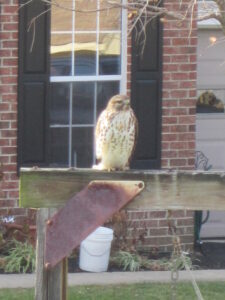 I’m always happy when a poem written years ago finds a home with a journal or anthology.
I’m always happy when a poem written years ago finds a home with a journal or anthology.
Back in winter 2011, when my children were still children, a hawk made a few visits to our backyard swingset. It was always an event, but especially that January, after a snowfall.
The poem is true to what happened that morning, and my feelings about it. But until last year “Hawk” remained unpublished.
 I’m so glad that it appears–along with two other poems of mine–in Bay to Ocean Journal 2021 (from the Eastern Shore Writers Association). I have one copy of the journal to give away. Leave a comment if you’d like a chance to win the book at random. (U.S. only please.)
I’m so glad that it appears–along with two other poems of mine–in Bay to Ocean Journal 2021 (from the Eastern Shore Writers Association). I have one copy of the journal to give away. Leave a comment if you’d like a chance to win the book at random. (U.S. only please.)
Hawk
By Laura Shovan
It is young, feathers puffed against the cold,
standing on the old swing set’s beam,
talons deep in last night’s snow.
We crowd the back door, take turns
with binoculars meant for star gazing.
The children get bored, return to breakfast
while I look and look. The bird’s eyes
are goofy with surprise. It can’t figure out
how it came to our yard, why it’s perched
on a dilapidated a swing set. It stares at our house
as if it knew this place once.
It looks confused, the way we all do,
finding ourselves in an undignified moment.
The hawk raises one yellow claw
places it deep in snow, swoops away.
The children pack for school and are gone.
When I stop and hold still, I get a little dizzy
from the suddenness of it.
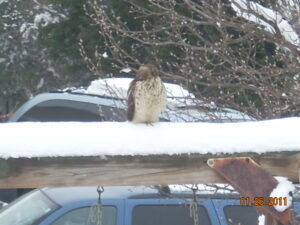
Read more about the Red Tailed Hawk at Maryland’s Department of Natural Resources website.
Tweet
January 27, 2022
Poetry Friday: Rhyme & Rhythm Giveaway

Hooray! It’s Irene Latham’s turn to host Poetry Friday. Stop by Live Your Poem for all of this week’s poetry links.
I’m just “back” from my first residency at Vermont College of Fine Arts. “Back” in quotes because the entire 10 days of panels, lectures, and workshops was virtual — but still magical! Focusing on the craft of writing for was the creative food I’d been craving.
One of the first events was a panel called, “The Creative S-T-R-E-T-C-H,” with author/faculty members Louise Hawes, Liz Garton Scanlon, Corey Ann Haydu, Linda Urban. This was all about letting go of your comfort zone as a writer and stretching “beyond your own expectations.” Stretch became a theme for the entire residency.
Today, I’m sharing a poem that made me stretch into a painful, honest memory.
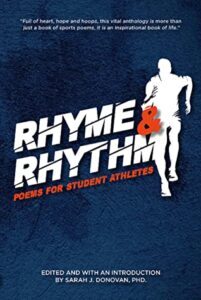
Can’t wait for the giveaway? Order your copy here.
I have two pieces in Sarah J. Donovan’s important anthology Rhyme & Rhythm: Poems for Student Athletes. [I’m giving away a copy of Rhyme & Rhythm. Leave a comment to enter!]
One is a poem I originally wrote for my wrestling book, Takedown, and then revised for this anthology. The other, “Running Stairs,” is my stretch piece.
This poem is a stretch because it’s fully autobiographical. “Running Stairs” offers a tiny window on one of the most difficult times of my life. Sophomore year of high school: I was struggling as a student, with friends, with my first serious boyfriend. I developed school refusal, staying home for days at a time.
But somewhere in there, I decided to join the fencing team. And for a little while, it made me feel strong.
Running Stairs
By Laura Shovan
At the start of practice we run stairs—
a pack of girls thundering
up and down the stairwell.
Doors closed. Windows foggy
with our heat. We’re laughing.
Boom, boom, boom.
I drip in my dad’s old sweatshirt
from Round Up Ranch.
The fleece is thin, perfectly broken in.
Thighs burning, stronger with each stair.
I watch our captain, legs thick with muscle—
a fencer’s true weapon. “Sprints!” she calls,
and we spill into the almost-empty senior hall.
He is there with a friend. I sprint closer,
part of the stampede, but he singles me out,
eyes on my sweatshirt. “Round Cup Ranch!”
he points. His friend doubles over, laughing.
“Jerk,” one of my teammates mumbles.
We disappear down the stairwell,
where I feel every bounce
of my too-large breasts, feel out of breath,
stop running, stop wearing
Dad’s comfortable old sweatshirt,
stop showing up for practice,
avoid stairwells, forget I was training
to be a girl with a weapon in her grasp.
Special thanks to Sarah J. Donovan for including this poem in Rhyme & Rhythm. Would you like to win a copy of the book? Leave a comment below to be entered in a random drawing. U.S. only please.
Tweet



